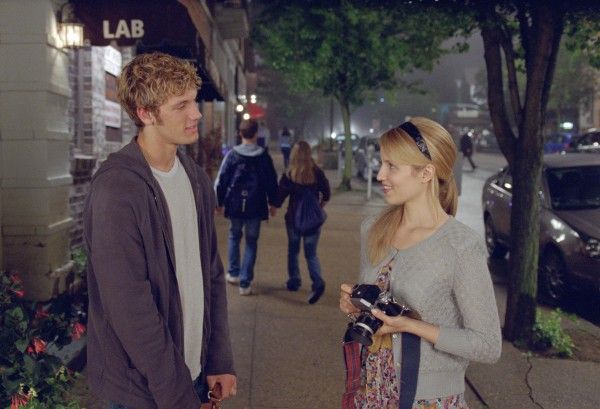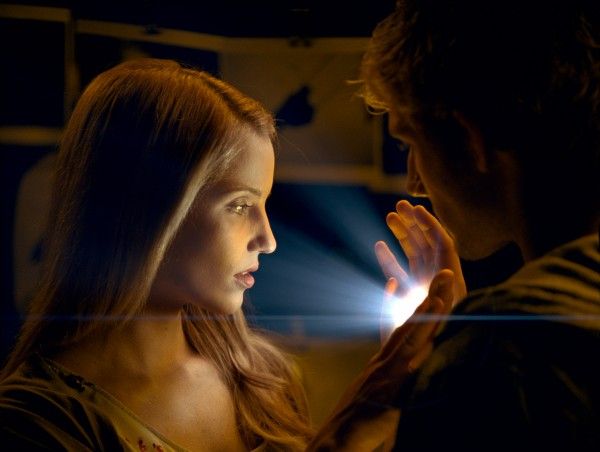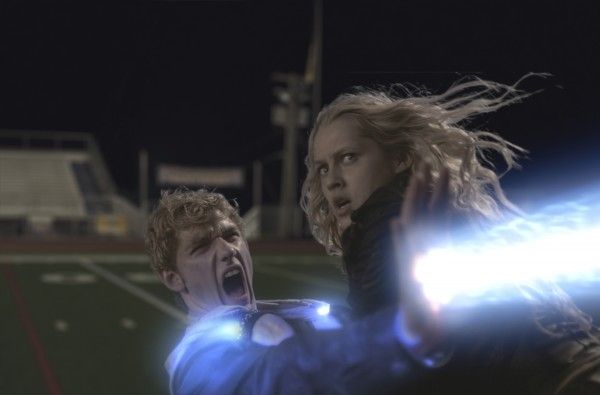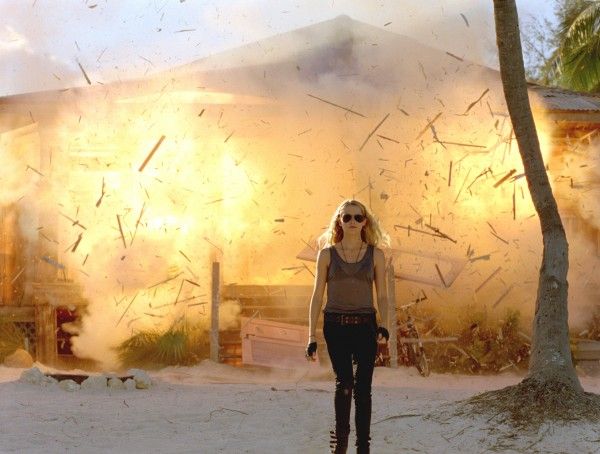Marti Noxon has written and executive produced for many critically acclaimed television series including Buffy the Vampire Slayer, Grey’s Anatomy, Private Practice, Brothers & Sisters, Point Pleasant and Still Life. She has also been a consulting producer for Mad Men, Prison Break and Angel. And now, to prove how in-demand she has become, she has also written two highly anticipated feature films for DreamWorks, with I Am Number Four (due out on February 18th) and the re-vamped Fright Night (due out in August).While at the press day for I Am Number Four, Marti Noxon did this exclusive interview with Collider, where she talked about how she came to the film, what her input and changes were on the script, balancing all of the aspects of such a complex story, why she thinks she can connect so well with high schoolers, why audiences connect so strongly with supernatural stories about young people, and what made her decide to be a storyteller, in the first place. Check out what she had to say after the jump: Question: How did I Am Number Four come to you?MARTI NOXON: It was Spring last year, and there had already been two other writers on the project. It was a blinking green light, where it was almost greenlit, but not quite. I had just done Fright Night for DreamWorks, and they said, “Hey, you wanna do a couple weeks work on this? It shouldn’t be too long.†And, I ended up on it for probably about six weeks, doing the kind of stuff you do at the end, like a lot of character work and some structural stuff, but the script was in pretty good shape. In the draft in between [Miles] Millar and [Al] Gough, and the one that I did, it got a little dry. It lost some of its fun and it definitely lost some of its romance. They came to me and said, “Could you make us want them to kiss again?†When you were given the project, did you go back to the original source material or did you just work with the script?NOXON: In this case, there were a lot of things about the draft that I was working from that was sound, and I never read Millar and Gough’s draft. They wanted me to work from where it was. Of course, I read parts of the book, but they also needed it like the next day, so I could only read chunks that referred to what I was doing. I never got a chance to read the whole book because it was, literally, under a huge time crunch. So, the source material was really just the script and the book.Were there specific things that you knew you needed to bring to the material, and were there specific things that you knew you needed to change?NOXON: When I first looked at the material and then I saw where we were, there was a contrast between the fun factor and where it had gotten to. It had gotten a little more serious. I was like, “For the audience I think you’re going after, it’s lost some of its joy.†And, they really wanted the romance to be a part of it. The female character had gotten pretty dry. She just wasn’t someone I thought girls would like. There were things like that where I automatically knew they needed some addressing. The other thing we did was that we ended up taking some of the mythology out. There was a lot of exposition in the draft that I worked from, that really just bogged stuff down. It didn’t add to the emotional life of the characters and it was stuff you never saw. It was a lot of off screen talk about, “Back on Lorien . . .†We took a lot of that out ‘cause it was just more confusing than enlightened.
Question: How did I Am Number Four come to you?MARTI NOXON: It was Spring last year, and there had already been two other writers on the project. It was a blinking green light, where it was almost greenlit, but not quite. I had just done Fright Night for DreamWorks, and they said, “Hey, you wanna do a couple weeks work on this? It shouldn’t be too long.†And, I ended up on it for probably about six weeks, doing the kind of stuff you do at the end, like a lot of character work and some structural stuff, but the script was in pretty good shape. In the draft in between [Miles] Millar and [Al] Gough, and the one that I did, it got a little dry. It lost some of its fun and it definitely lost some of its romance. They came to me and said, “Could you make us want them to kiss again?†When you were given the project, did you go back to the original source material or did you just work with the script?NOXON: In this case, there were a lot of things about the draft that I was working from that was sound, and I never read Millar and Gough’s draft. They wanted me to work from where it was. Of course, I read parts of the book, but they also needed it like the next day, so I could only read chunks that referred to what I was doing. I never got a chance to read the whole book because it was, literally, under a huge time crunch. So, the source material was really just the script and the book.Were there specific things that you knew you needed to bring to the material, and were there specific things that you knew you needed to change?NOXON: When I first looked at the material and then I saw where we were, there was a contrast between the fun factor and where it had gotten to. It had gotten a little more serious. I was like, “For the audience I think you’re going after, it’s lost some of its joy.†And, they really wanted the romance to be a part of it. The female character had gotten pretty dry. She just wasn’t someone I thought girls would like. There were things like that where I automatically knew they needed some addressing. The other thing we did was that we ended up taking some of the mythology out. There was a lot of exposition in the draft that I worked from, that really just bogged stuff down. It didn’t add to the emotional life of the characters and it was stuff you never saw. It was a lot of off screen talk about, “Back on Lorien . . .†We took a lot of that out ‘cause it was just more confusing than enlightened. Were you surprised with how scary the film is?NOXON: Yeah, I took my 8-year-old son and he was like, “Woah!†But, I kept telling him, “Don’t worry, it’s going to be all right,†or “Here’s the time to cover your eyes.†I knew with (director) D.J. [Caruso] that it was going to be scary and it was going to be exciting ‘cause he’s such a good director. He brings that to the table. There are so many elements to this story with the aliens and the superpowers, the high school aspect and the love story. Was there one thing that you responded to the most?NOXON: I’m a sucker for that mix of high school identity issues combined with the supernatural. I love that stuff. When you have so much going on in one story, is it hard to find the balance for everything so that everything gets its time?NOXON: Yeah, that’s the trick with any movie like this, or any story like this. You have to find the right balance of mythology and letting people into the world while, at the same time, making it feel grounded and keeping it moving. We had a scene in it that was like death, where an elder explained it all. You understood, a little bit better, what had happened and why, but at the same time, it just took you right out of the movie. We were fiddling with that kind of stuff, until the very end. We were writing and rewriting those bits. There’s one scene that I probably wrote eight times, and it didn’t make it into the movie.What did you think about the cast in this film?NOXON: I went to one of the test previews and basically the girls were just like, “[Alex Pettyfer] is awesome. We want to wear his skin and touch him with our faces.†And, the boys were like that about Dianna [Agron] and Number Six (Teresa Palmer). We’ve got the attractive thing going.
Were you surprised with how scary the film is?NOXON: Yeah, I took my 8-year-old son and he was like, “Woah!†But, I kept telling him, “Don’t worry, it’s going to be all right,†or “Here’s the time to cover your eyes.†I knew with (director) D.J. [Caruso] that it was going to be scary and it was going to be exciting ‘cause he’s such a good director. He brings that to the table. There are so many elements to this story with the aliens and the superpowers, the high school aspect and the love story. Was there one thing that you responded to the most?NOXON: I’m a sucker for that mix of high school identity issues combined with the supernatural. I love that stuff. When you have so much going on in one story, is it hard to find the balance for everything so that everything gets its time?NOXON: Yeah, that’s the trick with any movie like this, or any story like this. You have to find the right balance of mythology and letting people into the world while, at the same time, making it feel grounded and keeping it moving. We had a scene in it that was like death, where an elder explained it all. You understood, a little bit better, what had happened and why, but at the same time, it just took you right out of the movie. We were fiddling with that kind of stuff, until the very end. We were writing and rewriting those bits. There’s one scene that I probably wrote eight times, and it didn’t make it into the movie.What did you think about the cast in this film?NOXON: I went to one of the test previews and basically the girls were just like, “[Alex Pettyfer] is awesome. We want to wear his skin and touch him with our faces.†And, the boys were like that about Dianna [Agron] and Number Six (Teresa Palmer). We’ve got the attractive thing going. You’ve had a lot of success with writing for high school characters. Why do you think it is that you’re able to connect so well with high schoolers?NOXON: So, what you’re asking is, “Am I really immature?,†and the answer is, “Yes.†I’m overly inclined to being socially wounded and self-conscious and hopelessly romantic and dramatic, so all those things really lend themselves to that. The hardest part, when you’ve been doing it for awhile, is just making sure the vernacular sounds credible and that the kids actually sound like what kids sound like, so I do a lot of eavesdropping. I love being in a public space where teenagers are talking. And, the funny thing is that it hasn’t changed that much. There’s certainly slang that I’m not familiar with, but among the average teen, it’s still the same. You’re always looking for something fresh, but kids still talk like kids. If they’re smart, they can come up with better insults. It’s not like Buffy, where we invented a language for them. It’s really crafted. I went back and looked at some episodes recently, which I hadn’t done in a long time, and I was like, “God, I forgot how stylized the dialogue was.†It was deep. We were writing in our own form, practically. Joss [Whedon] didn’t want them talking in a slang that would get outdated, so we just did our own. Why do you think it is that supernatural stories about young people seem to connect with audiences so much?NOXON: Yeah, it’s really all over the place. That’s a good question. At least for me, if you tell straight stories about teenagers, it’s hard to work with metaphor or ideas about what it means without being really obvious and really melodramatic. The great thing about the story of Twilight, or the story of I Am Number Four is that you get to deal with real issues of identity and what people are going through and the choice of who you’re going to be, but it’s all large. It’s this much bigger canvas. Plus, those are the ages when we’re transforming into something else, so I think it’s natural that genre stuff just fits well with it. And, hormones are boiling. It’s a good age for transformational stories.
You’ve had a lot of success with writing for high school characters. Why do you think it is that you’re able to connect so well with high schoolers?NOXON: So, what you’re asking is, “Am I really immature?,†and the answer is, “Yes.†I’m overly inclined to being socially wounded and self-conscious and hopelessly romantic and dramatic, so all those things really lend themselves to that. The hardest part, when you’ve been doing it for awhile, is just making sure the vernacular sounds credible and that the kids actually sound like what kids sound like, so I do a lot of eavesdropping. I love being in a public space where teenagers are talking. And, the funny thing is that it hasn’t changed that much. There’s certainly slang that I’m not familiar with, but among the average teen, it’s still the same. You’re always looking for something fresh, but kids still talk like kids. If they’re smart, they can come up with better insults. It’s not like Buffy, where we invented a language for them. It’s really crafted. I went back and looked at some episodes recently, which I hadn’t done in a long time, and I was like, “God, I forgot how stylized the dialogue was.†It was deep. We were writing in our own form, practically. Joss [Whedon] didn’t want them talking in a slang that would get outdated, so we just did our own. Why do you think it is that supernatural stories about young people seem to connect with audiences so much?NOXON: Yeah, it’s really all over the place. That’s a good question. At least for me, if you tell straight stories about teenagers, it’s hard to work with metaphor or ideas about what it means without being really obvious and really melodramatic. The great thing about the story of Twilight, or the story of I Am Number Four is that you get to deal with real issues of identity and what people are going through and the choice of who you’re going to be, but it’s all large. It’s this much bigger canvas. Plus, those are the ages when we’re transforming into something else, so I think it’s natural that genre stuff just fits well with it. And, hormones are boiling. It’s a good age for transformational stories.  What originally made you want to be a storyteller?NOXON: It’s that stock answer. I didn’t really choose it. I was just picked on and weird enough to have to retreat into a fantasy world, and it became a safe place for me. I’ve always had a flare for the dramatic. I thought about being an actor and I thought about directing, but writing truly became something I needed to do, just to stay sane. It’s my over-pressure valve. If I don’t get this stuff out of my head, it’s not good. Now, it’s just something I have to do. I almost feel like it chose me. What a gift, to have something you end up loving as your work. What do you do to recharge the creative well?NOXON: A great thing, which I don’t do enough, is to take a break from producing and try to just take stuff in, like go to the theater. I spent some time in New York, just going to plays. I’ll go to a museum or go read some books. I also have a production company where we develop television, so I’m super-busy and I have two little kids. To me, the idea of being able to take a couple weeks and just digest some stuff would be fantastic. And, when I go running, a lot of times, that’s when something just pops up. Sometimes taking your mind off things, and getting out of your head and consciously trying not to think about it, that works. I have to mean it.You can also click here to read what she told us about the Fright Night remake.
What originally made you want to be a storyteller?NOXON: It’s that stock answer. I didn’t really choose it. I was just picked on and weird enough to have to retreat into a fantasy world, and it became a safe place for me. I’ve always had a flare for the dramatic. I thought about being an actor and I thought about directing, but writing truly became something I needed to do, just to stay sane. It’s my over-pressure valve. If I don’t get this stuff out of my head, it’s not good. Now, it’s just something I have to do. I almost feel like it chose me. What a gift, to have something you end up loving as your work. What do you do to recharge the creative well?NOXON: A great thing, which I don’t do enough, is to take a break from producing and try to just take stuff in, like go to the theater. I spent some time in New York, just going to plays. I’ll go to a museum or go read some books. I also have a production company where we develop television, so I’m super-busy and I have two little kids. To me, the idea of being able to take a couple weeks and just digest some stuff would be fantastic. And, when I go running, a lot of times, that’s when something just pops up. Sometimes taking your mind off things, and getting out of your head and consciously trying not to think about it, that works. I have to mean it.You can also click here to read what she told us about the Fright Night remake.

